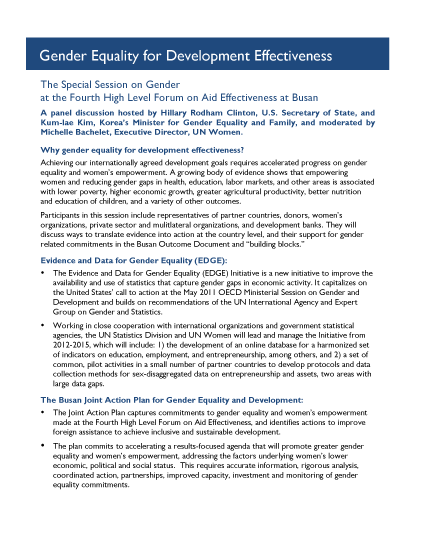Gender Equality for Development Effectiveness ![]() (pdf - 48k)
(pdf - 48k)
The Special Session on Gender at the Fourth High Level Forum on Aid Effectiveness at Busan
A panel discussion hosted by Hillary Rodham Clinton, U.S. Secretary of State, and Kum-lae Kim, Korea’s Minister for Gender Equality and Family, and moderated by Michelle Bachelet, Executive Director, UN Women.
Why gender equality for development effectiveness?
Achieving our internationally agreed development goals requires accelerated progress on gender equality and women’s empowerment. A growing body of evidence shows that empowering women and reducing gender gaps in health, education, labor markets, and other areas is associated with lower poverty, higher economic growth, greater agricultural productivity, better nutrition and education of children, and a variety of other outcomes.
Participants in this session include representatives of partner countries, donors, women’s organizations, private sector and mulitlateral organizations, and development banks. They will discuss ways to translate evidence into action at the country level, and their support for gender related commitments in the Busan Outcome Document and “building blocks.”
Evidence and Data for Gender Equality (EDGE):
- The Evidence and Data for Gender Equality (EDGE) Initiative is a new initiative to improve the availability and use of statistics that capture gender gaps in economic activity. It capitalizes on the United States’ call to action at the May 2011 OECD Ministerial Session on Gender and Development and builds on recommendations of the UN International Agency and Expert Group on Gender and Statistics.
- Working in close cooperation with international organizations and government statistical agencies, the UN Statistics Division and UN Women will lead and manage the Initiative from 2012-2015, which will include: 1) the development of an online database for a harmonized set of indicators on education, employment, and entrepreneurship, among others, and 2) a set of common, pilot activities in a small number of partner countries to develop protocols and data collection methods for sex-disaggregated data on entrepreneurship and assets, two areas with large data gaps.
The Busan Joint Action Plan for Gender Equality and Development:
- The Joint Action Plan captures commitments to gender equality and women’s empowerment made at the Fourth High Level Forum on Aid Effectiveness, and identifies actions to improve foreign assistance to achieve inclusive and sustainable development.
- The plan commits to accelerating a results-focused agenda that will promote greater gender equality and women’s empowerment, addressing the factors underlying women’s lower economic, political and social status. This requires accurate information, rigorous analysis, coordinated action, partnerships, improved capacity, investment and monitoring of gender equality commitments.








Comment
Make a general inquiry or suggest an improvement.